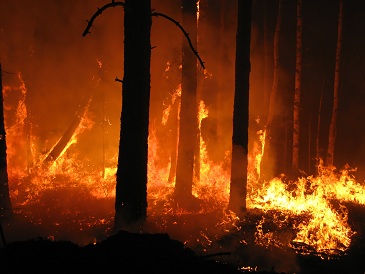Uniting the front against forest fires

date: 19/07/2014
acronym: FIRESMART
See also: CORDIS
Contact: http://www.gmv.com/en/Company/Commu...
The European Union (EU)-funded FIRESMART project set out to unify Europe’s scattered forest fire knowledge and offer a more pan-European approach to fire prevention. “Before the project started, knowledge about forest fire prevention was atomised between countries and even regions,” says Dr. Ana Sebastián López, a forest engineer from the technological business group, GMV, Spain, who coordinated the project.
In the past, EU countries tackled fire prevention according to their respective national legal frameworks. The lack of unified forest fire knowledge meant that the methodologies used for forest fire prevention were often not the best practices. “Assembling fire prevention knowledge was a challenge – a reason being that a substantial amount was not publicly available, meaning we actually had to go and interview local or national forest fire managers to obtain the information,” explains Sebastián. The data gathered was analysed to identify strengths, weaknesses and knowledge gaps. Next, the project team drafted a strategy roadmap containing recommendations for future best practices.
“Over the course of the project, we did our best to disseminate our results to a wider audience,” says Sebastián. In addition to the project website (where information is available in English, French, Italian, Spanish and Portuguese), stakeholders from the entire silvicultural chain (i.e. from the forest to the forest-based industry) were connected through several local as well as international workshops to share their perspectives.
By applying a novel SWOT (Strengths, Weaknesses, Opportunities and Threats) analysis, the FIRESMART team was able to show that fire prevention should not be conceived as an independent, isolated policy, but as an integral part of sustainable forest management. Indeed, the best way to fight forest fires is to prevent them from ever starting. Educating the public to avoid high-risk behaviour in wooded areas is therefore also an important measure in fire prevention. Particularly in fire-prone regions, such as the Mediterranean basin, integrating fire prevention policy into the fight against forest fires is crucial if it is to be efficient and cost-effective. “The system will only work once there are long-term, integrated policies and a constant budget for fire prevention to put those policies into practice,” adds Sebastián.
Industries from tourism to silviculture stand to benefit from successful forest fire prevention. Beyond that, however, FIRESMART project brings a significant contribution to human safety, the protection of the environment and the conservation of biological diversity.
“We are happy to see the impact of our project,” says Sebastián. “Our website has received almost 7,000 visits from all over the world and the network we have created is growing stronger every day.”
